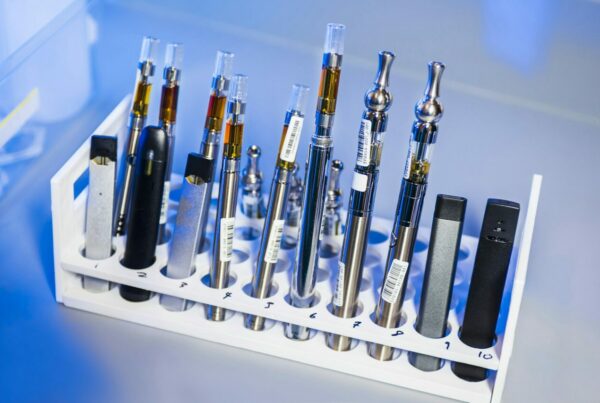N, N-Dimethyltryptamine (DMT) is a compound commonly found in both flora and fauna, known for its potent yet brief psychedelic effects upon ingestion.
Emerging research indicates that DMT, which is naturally produced within the body, plays essential roles in the peripheral and central nervous systems and may serve as a neurotransmitter.
DMT can trigger strong psychedelic effects, generally without many negative side effects, although potential cardiovascular problems may arise when administered in high doses via injection.
Let’s explore DMT and its diverse roles, ranging from recreational use to its intriguing potential for scientific research and therapeutic use.

DMT at a Glance: What is it?
| Aspect | Details |
| Name | N, N-Dimethyltryptamine (DMT) |
| Classification | Indole alkaloid |
| Occurrence | Naturally found in various plants and animals |
| Psychoactive Effects | Brief, intense psychedelic experiences upon consumption. |
| Method of Consumption | Can be ingested by smoking, injection, or orally. |
| Duration of Effects | Short duration, usually between 5 and 30 minutes. |
| Chemical Structure | Composed of a tryptamine core with two methyl groups attached to the nitrogen atom of the amine group. |
| Metabolism | Rapidly metabolized by the body, broken down by monoamine oxidase (MAO). |
| Cultural Use | Historically used in various ceremonial and shamanic rituals by indigenous cultures. |
| Other names | Dimitri, Fantasia, Businessman’s trip, Businessman’s special, 45-minute psychosis, Spiritual molecule |
The Role of DMT in Mental Health
The compound N, N-Dimethyltryptamine (DMT), famous for its potent psychedelic effects, is sparking curiosity for potential benefits to mental health. Despite its conventional association with intense visionary experiences, recent research suggests a relationship between DMT and mental wellness.
Influence on Psychological and Emotional Well-being
The psychedelic effects of DMT are renowned for eliciting deep emotional reactions and altering states of consciousness. These effects hold the potential to pave new therapeutic routes for managing mental health issues, facilitating emotional processing, and providing new perspectives on personal traumas.
Neuroplasticity and Brain Function
Research suggests that DMT could influence neuroplasticity, enhancing the brain’s ability to change and reorganize. Investigating its impact on synaptic plasticity and neural connectivity may offer possible treatments for conditions linked to neural maladaptations.
Potential Therapeutic Application in Mental Health Disorders
Early research underscores the potential of DMT in treating disorders such as depression, addiction, and PTSD. Its ability to evoke mystical or spiritual experiences could present a novel psychotherapeutic approach and aid in transforming negative thought patterns.
The exploration of DMT’s natural presence in the body highlights its significance in mental health resilience, stress response, and overall psychological well-being. Understanding how the body controls internal DMT levels could lay the groundwork for novel therapeutic interventions.
DMT and Mental Health Disorders
| Mental Health Disorder | Definition | Effectiveness of DMT | Benefits |
| Depression | Defined as a mood disorder characterized by persistent sadness, lack of interest, and reduced motivation | Early studies suggest DMT could relieve symptoms by inducing deeply emotional experiences. | Its rapid onset and ability to inspire transformative experiences might provide innovative therapeutic approaches for reshaping negative thought patterns and enhancing emotional processing |
| Post-Traumatic Stress Disorder (PTSD) | A mental health disorder triggered by traumatic events leading to flashbacks, intense anxiety, and intrusive thoughts | Preliminary research points to DMT’s potential in managing symptoms by inducing spiritual or mystical experiences that could help patients reframe traumatic memories | DMT’s potential to trigger altered states of consciousness could facilitate emotional processing and offer a fresh perspective on traumatic experiences |
| Addiction | A complex disorder marked by compulsive engagement in rewarding stimuli despite adverse consequences | Certain studies suggest DMT could play a role in breaking addictive patterns and reducing cravings for substances | DMT’s ability to provoke intense and transformative experiences could help individuals modify their behavioural patterns and confront their addictions |
Approach to Utilizing DMT
DMT, famed for its short but potent psychedelic effects, can be administered in a variety of ways. The chosen method often hinges on the desired intensity and duration of the experience.
Smoking:
When DMT is smoked in a pipe or vaporized, it requires meticulous temperature management to avoid overheating and burning the compound. The psychedelic effects kick in almost instantly when DMT is smoked, usually lasting anywhere from 5 to 15 minutes.
Oral Intake:
Consuming DMT orally leads to slower, but significantly longer-lasting effects, often spanning several hours. This is attributed to the slower metabolization of DMT in conjunction with an MAOI.
Injection:
Injecting DMT directly into the bloodstream results in rapid and powerful effects.
This method induces an immediate and intense experience, but it necessitates precise dosage and carries higher risks.
Insufflation (Snorting):
Snorting DMT initiates a slower onset of effects compared to smoking but may offer a more prolonged experience.
Sublingual or Buccal Administration:
When absorbed through the oral mucosa, this method provides an alternative to smoking and yields a longer, though less intense, experience.
Setting Therapeutic Dosage: N, N-Dimethyltryptamine (DMT)
For smoking, the suggested dosage lies between 20 to 40 mg, while for intravenous application, the recommended dosage is 0.2 to 0.4 mg per kg of body weight. These dosage recommendations are primarily intended for clinical research and are especially important for intravenous administration.
- Higher doses administered intravenously are associated with intense visuals, temporary loss of control, and a mixed state of anxiety and euphoria
- Interestingly, lower doses have elicited less favorable effects
- Recreational doses of smoked DMT typically range from 40 to 50 mg, occasionally even peaking at 100 mg
- Different doses of intravenous DMT (with solutions of 7, 14, 18, and 20 mg) linked to near-death experiences has been found to result in positive and enduring enhancements in mental health.
Availability of DMT
Osmosis – 4-ACO-DMT Ethereal Essence Tincture
This tincture purportedly contains 4-Acetoxy-N, N-dimethyltryptamine (4-AcO-DMT), a DMT variant. Tinctures are liquid extractions intended for oral use, and this particular product may offer an experience distinct from the usual DMT.
Lucid Supply Co. – 5-MeO DMT Vaporizer
This product is a vaporizer containing 5-Methoxy-N, N-dimethyltryptamine (5-MeO-DMT). This substance is renowned for its potent, transformative, and often short-lived experiences, with 5-MeO-DMT being the active component.
Integral Alchemist – Acacia – 1ml DMT Vape Cartridge
The DMT vape cartridge from Integral Alchemist comes filled with N, N-Dimethyltryptamine. This product is likely aimed at those who favor a discreet and convenient DMT consumption method.
Deadhead Chemist – 5-Meo-DMT Cartridge
This cartridge contains 5-Methoxy-N, N-dimethyltryptamine (5-MeO-DMT), a substance known for its deep and intense effects.
Potential psychological health benefits might be associated with personal growth, spiritual experiences, or therapeutic applications aimed at enhancing emotional well-being.
Deadhead Chemist – N, N DMT Cartridge
Another offering from Deadhead Chemist, this cartridge hosts the traditional N, N-Dimethyltryptamine. Cartridges provide a straightforward method for DMT consumption, ensuring a more consistent and controlled experience.
Concluding Remarks
The use of N, N-Dimethyltryptamine (DMT) in
Are there potential risks linked with DMT use?
While DMT is generally considered safe under supervised use, it’s important to be aware of potential risks and side effects, especially for those with a history of mental health disorders.
Original HTML:Mental health therapy offers an intriguing yet complex journey. The substance’s ability to induce powerful yet transient psychedelic experiences opens up new therapeutic avenues.
Early studies indicate its potential involvement in emotional processing, personal development, and perhaps
The profound influence of mental health therapy requires careful consideration and responsible usage.
For those keen on responsibly discovering DMT products, reliable sources like Magic Mushrooms Hamilton Canada Online Dispensary are available to offer guidance and present a variety of options.
Frequently Asked Questions:
How do different DMT products affect mental health?
For instance, vaporizers may yield rapid effects, whereas tinctures or vape cartridges might provide more controllable and steady doses.
Introducing derivative compounds or 5-MeO-DMT can result in varying intensity levels and different types of impacts on mental health.
These minor differences underline the importance of selecting a DMT product based on individual needs and mental health goals.
Can DMT lead to enduring improvements in mental health and personal growth?
User testimonials suggest that DMT-induced experiences could potentially cause long-term effects on mental health and personal development.
Deeply influential or transformative encounters, such as those resembling near-death experiences, are frequently associated with ongoing positive changes in psychological wellbeing and personal development.
Although these experiences are intense and ephemeral, they typically result in introspection, spiritual revelations, and a sense of unity or enlightenment.
Users often report a refreshed perspective on life, enhanced emotional resilience, and an increased appreciation for life after these experiences.
What is the optimal strategy for applying DMT for mental health purposes?
It’s crucial to make educated decisions, which involve thorough research and understanding of the compound’s effects.
Advice from mental health professionals or seasoned users can provide essential insights into potential risks and benefits.
Understanding personal tolerance levels and mental preparedness is also vital, along with ensuring a supportive and safe setting for the experience.
Are there any associated risks with DMT use?
Although DMT is generally deemed safe with supervised use, it’s essential to be mindful of potential risks and side effects, particularly for individuals with a history of mental health issues.
Comparing DMT with other psychedelic treatments such as psilocybin or LSD for mental health therapy: How do they stack up?
DMT’s effects, duration, and intensity vary in comparison to other psychedelics like psilocybin or LSD, particularly in its brief duration.
Highly intense, short-acting psychedelics like DMT necessitate unique therapeutic strategies in mental health, contrasting with the methods used for psychedelics with longer effects.
Recommended Additional Reading:





